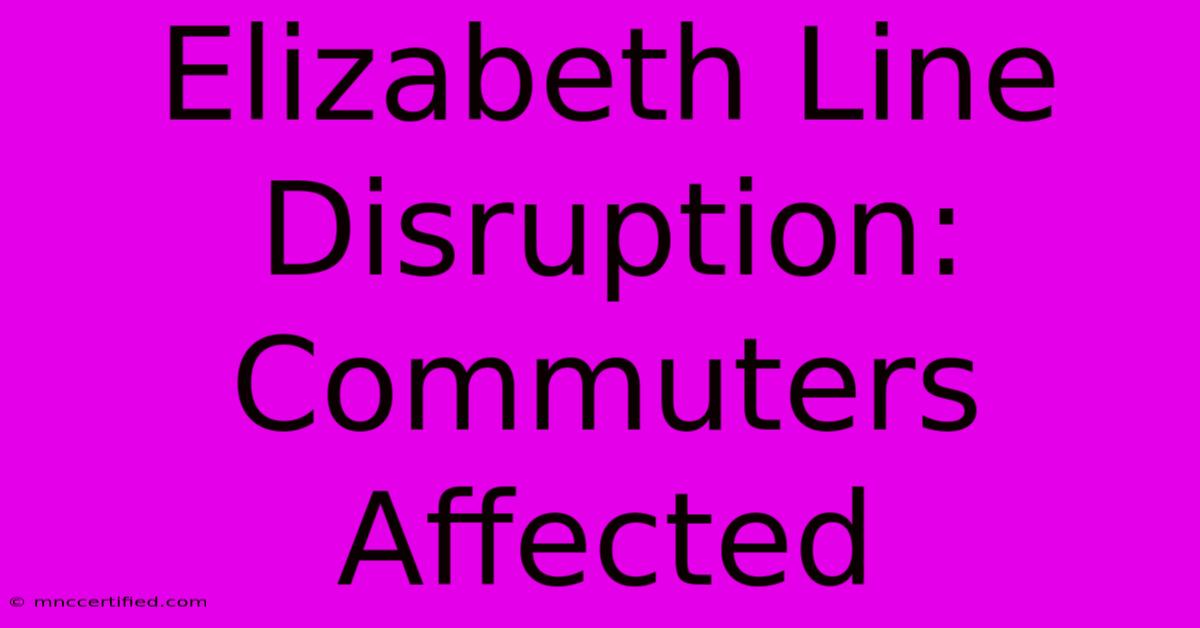Elizabeth Line Disruption: Commuters Affected

Table of Contents
Elizabeth Line Disruption: Commuters Face Ongoing Challenges
The Elizabeth Line, a significant addition to London's transport network, has experienced several disruptions since its launch, causing significant inconvenience for commuters. This article explores the causes of these disruptions, their impact on passengers, and what steps are being taken to mitigate future problems. We'll delve into the specifics, offering insights for those regularly using the line and highlighting the ongoing challenges faced by Transport for London (TfL).
Understanding the Disruptions: Causes and Consequences
The Elizabeth Line, while lauded as a modern marvel of engineering, has faced its share of operational challenges. These disruptions range from signal failures and power supply issues to staff shortages and track problems. These seemingly small issues can have a cascading effect, leading to significant delays, cancellations, and overcrowding on already busy services.
Impact on Commuters: More Than Just Delays
The impact on commuters extends far beyond mere delays. The disruptions cause:
- Increased travel time: Unexpected delays can significantly increase commute times, leading to lateness for work or appointments.
- Stress and frustration: The uncertainty and inconvenience caused by disruptions contribute to stress and frustration among passengers.
- Financial implications: Missed work or appointments can result in lost income or productivity.
- Safety concerns: Overcrowding on alternative transport options can pose safety risks.
These disruptions disproportionately affect those reliant on the Elizabeth Line for their daily commute, impacting their work-life balance and overall well-being.
TfL's Response and Future Improvements
TfL has acknowledged the challenges and has implemented various measures to address the issues:
- Improved signalling systems: Ongoing investment in upgrading signalling systems aims to improve reliability and reduce signal failures.
- Increased maintenance: Regular maintenance schedules and proactive inspections are being implemented to identify and rectify potential problems before they escalate.
- Staff training and recruitment: TfL is investing in staff training and recruitment to ensure sufficient personnel are available to manage the line effectively.
- Enhanced communication: Improved communication strategies aim to provide passengers with timely and accurate information regarding disruptions.
While these measures are underway, commuters still face ongoing challenges, highlighting the complexity of managing such a vast and intricate transport system.
Navigating Disruptions: Tips for Commuters
For commuters regularly using the Elizabeth Line, here are some practical tips to help navigate disruptions:
- Check the TfL website and app: Regularly check the TfL website and app for real-time updates and planned engineering works.
- Plan alternative routes: Have alternative travel plans in place, such as using the Tube or bus services, in case of disruptions.
- Allow extra travel time: Always allow extra time for your journey to account for potential delays.
- Stay informed: Subscribe to TfL alerts and follow their social media channels for the latest updates.
- Contact TfL customer service: If you experience significant disruption, contact TfL customer service to report the issue and seek assistance.
Conclusion: A Work in Progress
The Elizabeth Line represents a significant investment in London's transport infrastructure, but its journey has not been without its challenges. The ongoing disruptions highlight the complexities of operating a large-scale transport system and the importance of continuous improvement and investment in infrastructure and personnel. While TfL is actively addressing the issues, commuters will continue to need patience and flexibility while these improvements are implemented. Regular monitoring of TfL updates and proactive journey planning remain crucial for mitigating the impact of future disruptions.

Thank you for visiting our website wich cover about Elizabeth Line Disruption: Commuters Affected. We hope the information provided has been useful to you. Feel free to contact us if you have any questions or need further assistance. See you next time and dont miss to bookmark.
Featured Posts
-
Hallmark Insurance Agent Login
Nov 27, 2024
-
Are Volvos Expensive To Insure
Nov 27, 2024
-
All Cast Back For Vanderpump Rules Season 12
Nov 27, 2024
-
Morgan Freeman 87 Looks Healthy
Nov 27, 2024
-
Morrisons Shortages Shoppers Frustrated
Nov 27, 2024